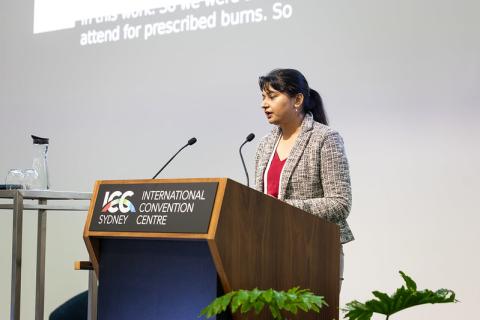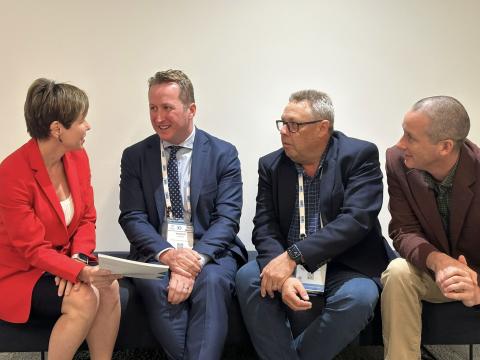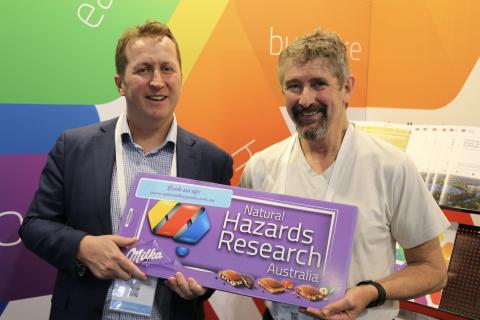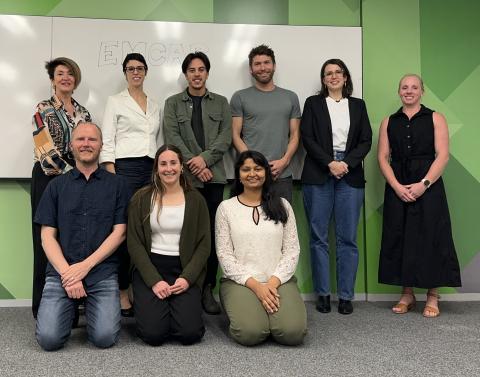


Research from Natural Hazards Research Australia (the Centre) was front and centre across four days at the AFAC24 powered by INTERSCHUTZ conference in Sydney from 2-6 September.
Celebrating its 30th anniversary, the Centre was proud to be the Industry Research Partner for the conference, which incorporated the Australian Disaster Resilience Conference and the Institution of Fire Engineers (Australia) National Conference.
Research from the Centre was featured throughout the conference week, as well as at the extensive trade exhibition, with an eye-catching poster display and the popular Centre booth.
The opening day was the Research and Innovation Day, with Centre CEO Andrew Gissing providing the opening keynote address. Andrew’s presentation celebrated 21 years of Commonwealth investment in natural hazards research and science in Australia – through the Bushfire Cooperative Research Centre, Bushfire and Natural Hazards Cooperative Research Centre and Natural Hazards Research Australia – and the many improvements across disaster resilience and emergency management in that time that are direct results of this investment.
Throughout the conference week, many Centre researchers and scholarship students presented their research:
Centre research Liza Gelt from Collaborative Consulting Co also took part in the Pitchfest competition.
Centre research was also highlighted by Deputy Coordinator-General Joe Buffone from the National Emergency Management Agency, who showcased the Principles of best practice strategic crisis management arrangements for catastrophic disasters, which are outcomes of research from CEO Andrew Gissing and researcher Dr Michael Eburn. The principles detail strategies and frameworks designed to enhance resilience and response capabilities during large-scale emergencies.

Image: Suki Jaiswal, AFAC
Meet the Minister
The conference presented a chance for the Centre to brief Senator the Hon Jenny McAllister, Federal Minister for Emergency Management, on the work of the Centre. Appointed to the emergency management portfolio in July, Centre Chair Iain MacKenzie, Board member Oliver Costello and CEO Andrew Gissing discussed with the Minister how research, innovation and science are keeping Australians safe, protecting the environment and improving disaster resilience

Image: Senator the Hon Jenny McAllister, Andrew Gissing, Iain MacKenzie, Oliver Costello
Building future workforce and capacity
A feature of the week at the Centre’s exhibition booth was a short talk highlighting the Centre programs that are building the next generation of leaders to increase Australia’s workforce and capability in natural hazards research and management. Hosted by Science and Innovation Director Prof Cheryl Desha, the audience gathered to hear about how research and innovation is building the future capacity of people and organisations for disaster risk reduction and how to get involved. The talk featured guest speakers:
Recap with this video below.
The Centre’s booth was a popular meeting place during the conference breaks, with a prize offered for delegates who visited the booth to learn more about how the Centre’s research is making a difference around the country. Bill Cook, a CFA volunteer at the St Leonards brigade in Victoria was the winner of the giant chocolate bar. Congratulations Bill.

Image: Andrew Gissing and Bill Cook
Network meets and practitioner awarded
With many faces from across the emergency management sector converging in Sydney, the conference was the opportune time for the recently established Early- and Mid-Career Academic and Practitioners (EMCAP) Network to get together for their first face-to-face meeting. The Network spent their time together strategising about opportunities to support the next generation of natural hazards leaders. Interested in learning more and being kept in the loop about future activities for early- and mid-career researchers and practitioners? Sign up for notifications here.
EMCAP Executive Committee member and former Disaster Challenge winner, Dr Kamarah Pooley, was recognised by AFAC in their annual awards. Kamarah, from Fire and Rescue NSW, was acknowledged for her innovative and creative contributions to the advancement of knowledge, innovation and research utilisation with the AFAC Knowledge and Innovation Award. Congratulations Kamarah.

Image: EMCAP Network Executive Committee